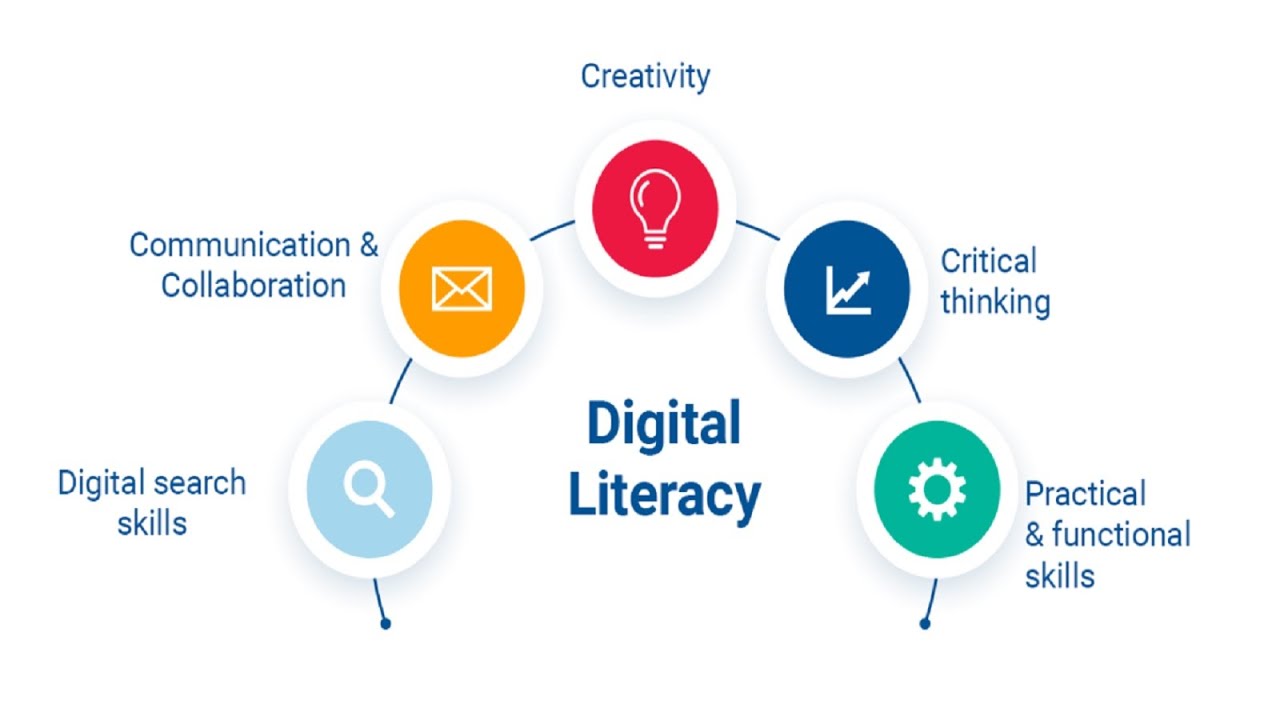4 Pilar Literasi Digital - SMART ASN #LatsarCPNS2022 #LatsarKemenhub #asnberakhlak
Summary
TLDRThis video by Diajeng Ayu Dewi discusses the four pillars of digital literacy, which are essential for modern technology use. She covers Digital Skills, Digital Culture, Digital Ethics, and Digital Safety. The content explains how these skills help individuals navigate and use digital tools effectively, respect online communication norms, and protect personal data. Examples like using Zoom, Microsoft Office, and secure communication apps are highlighted. The video emphasizes the importance of adopting these skills to improve work efficiency, communication, and overall digital awareness.
Takeaways
- 😀 Digital literacy refers to the ability to access, manage, understand, integrate, communicate, evaluate, and create information securely and accurately through digital technology.
- 😀 The four pillars of digital literacy are digital skills, digital culture, digital ethics, and digital safety.
- 😀 Digital skills involve knowing how to use digital hardware, software, and operating systems in daily life.
- 😀 Examples of digital skills include using Zoom for meetings and Microsoft Office for office work, aiding productivity.
- 😀 Digital culture is the ability to understand and apply national values like Pancasila and Bhinneka Tunggal Ika in daily digital interactions.
- 😀 Digital culture also involves using digital technology for easier communication, like sending emails or messages through WhatsApp or Telegram.
- 😀 Digital ethics focuses on understanding, applying, and promoting good digital etiquette and behavior when using technology.
- 😀 Good digital ethics include being polite, respectful, and considerate, especially when communicating with colleagues or superiors through digital platforms.
- 😀 Digital safety refers to the awareness and practices to protect personal data and ensure online security.
- 😀 To practice digital safety, individuals should avoid spreading false information, respect privacy, and refrain from online criminal activities like hacking or fraud.
- 😀 Applying the four pillars of digital literacy improves skills, enhances work efficiency, strengthens communication, and saves time and costs.
Q & A
What is digital literacy?
-Digital literacy refers to the ability to access, manage, understand, integrate, communicate, evaluate, and create information in a safe and accurate manner using digital technologies.
What are the four pillars of digital literacy?
-The four pillars of digital literacy are Digital Skills, Digital Culture, Digital Ethics, and Digital Safety.
What does Digital Skills entail?
-Digital Skills involve an individual's ability to understand, use, and manage hardware, software, and digital operating systems in everyday life, such as using Zoom for meetings or Microsoft Office for work tasks.
How does Digital Culture contribute to digital literacy?
-Digital Culture is the ability to interpret, understand, and promote the values of national unity, Pancasila, and Bhinneka Tunggal Ika, through the use of technology, like the ease of sending messages via email or apps such as WhatsApp or Telegram.
What is meant by Digital Ethics?
-Digital Ethics involves recognizing and adopting appropriate behavior, rationalizing, and implementing ethical digital governance or etiquette, such as using polite language and respecting colleagues and leaders in digital communication.
Why is Digital Safety important?
-Digital Safety is about understanding and applying measures to protect personal data and ensure digital security, including avoiding sharing unverified information, refraining from spreading hoaxes, and not engaging in online fraud or hacking.
What are some examples of Digital Skills in use?
-Examples of Digital Skills include mastering tools like Zoom for online meetings or using Microsoft Office to facilitate everyday office work.
How has technology improved communication in terms of Digital Culture?
-Technology has made communication faster and more accessible, as people can send messages and documents instantly through platforms like email, WhatsApp, and Telegram, compared to the older, slower methods.
How does Digital Ethics apply to communication with colleagues?
-Digital Ethics ensures that when communicating with colleagues, especially in professional settings, individuals should use polite, respectful language and practice good etiquette, like saying 'please', 'thank you', and 'sorry' when appropriate.
What are the benefits of applying the four pillars of digital literacy?
-Applying the four pillars of digital literacy helps increase personal skills, improves efficiency and effectiveness in work tasks, enhances communication and collaboration, allows for faster information access, and helps save costs and resources.
Outlines

This section is available to paid users only. Please upgrade to access this part.
Upgrade NowMindmap

This section is available to paid users only. Please upgrade to access this part.
Upgrade NowKeywords

This section is available to paid users only. Please upgrade to access this part.
Upgrade NowHighlights

This section is available to paid users only. Please upgrade to access this part.
Upgrade NowTranscripts

This section is available to paid users only. Please upgrade to access this part.
Upgrade NowBrowse More Related Video

Mengenal Empat Pilar Utama Literasi Digital | Kecakapan, Budaya, Etika, dan Keamanan Digital

Empat Pilar Literasi Digital, Apa Itu??

¿Qué es Bienestar Digital y para que sirve?

Pentingnya kewarganegaraan digital dan bagaimana cara menjadi warga digital yang baik

Digital Citizenship Lesson

Literasi Digital : Cakap Digital
5.0 / 5 (0 votes)